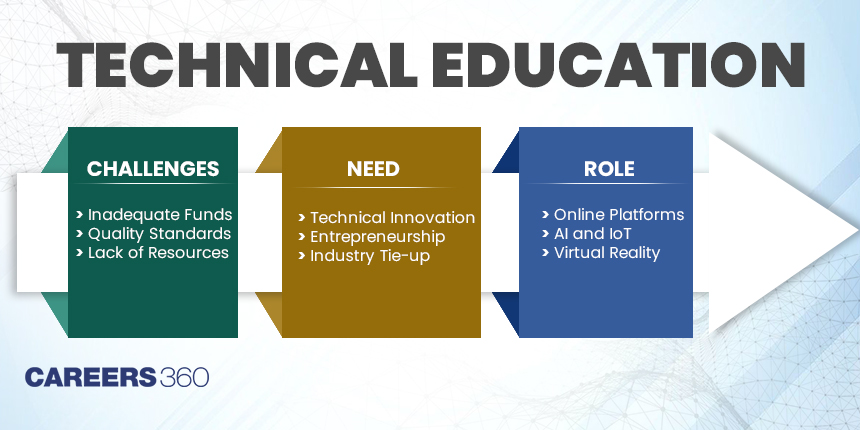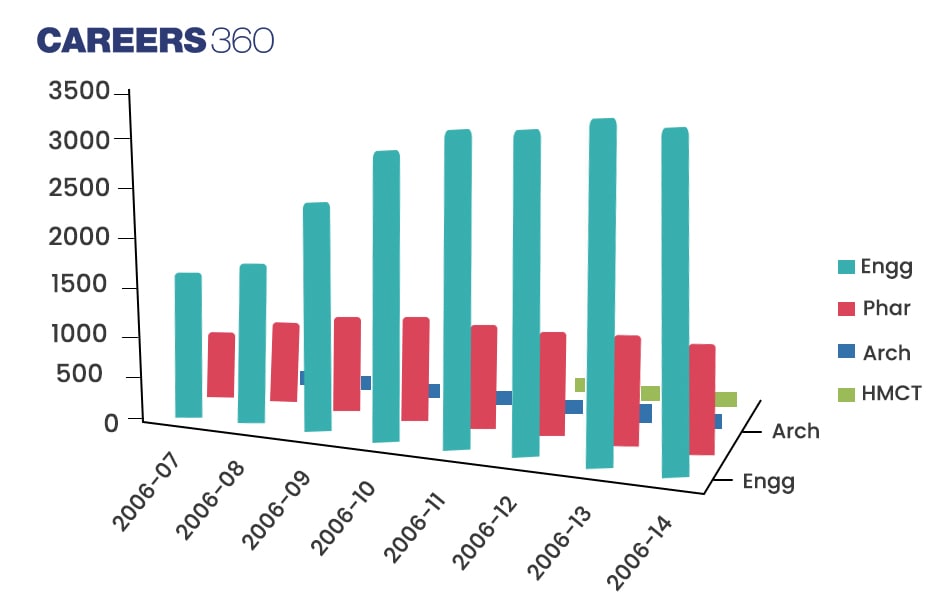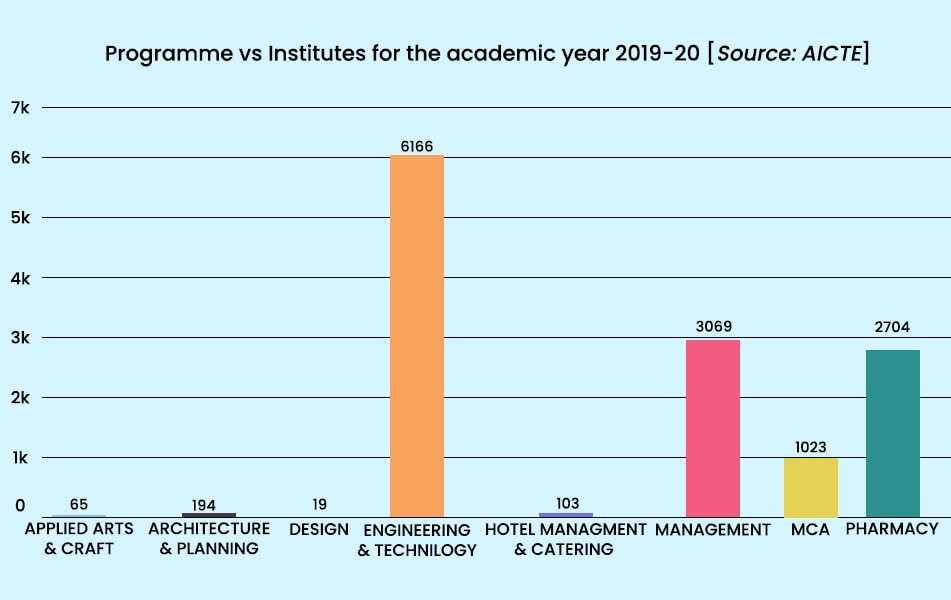Technical Education and its Need in India
India is a country where technical education has been provided for a long time. On average, annually India produces more than 15 lakh engineers, as of 2021 data. The data of AICTE 2020-21 shows its approval to more than 190 education institutes focusing on technical degrees such as Design, Engineering and Technology, Management, MCA, and Pharmacy.

IITs, IISc, IIMs, IISERs, NITs, IIITs, and thousands of other technical institutions funded by the central/state government, and other private bodies are available in India. All India Council for Technical Education (AICTE) and University Grants Commission (UGC) like educational bodies are responsible for maintaining the standard of technical education in the country.
So, it is clear that there are many technical education institutes present in the country. But then why is India in the 62nd position on the list of the world’s most technologically advanced countries [Source: Global Finance Magazine 2023]? Why is India still lagging in research and building a scientific ecosystem? These are some questions that surely demand attention!
In this article, we will try to find out the importance of technical education, its challenges, and its role in the future.
What is Technical Education?
Technical education refers to the study of subjects that are based on scientific principles and technical knowledge. Many of you might think engineering is the only area of study in this vast term- “Technical Education”. But that is not true and management, architecture, and pharmacy to name a few are other disciplines that come under Technical Education.
Technical education enhances the scientific temperament of individuals which is vital in this ever-evolving world. It aims to provide practical skills and knowledge related to industry trends and prepare graduates for roles in engineering, medicine, and various other fields.

This graph shows the AICTE grant for technical education to different institutes between 2006-14.
Lack of Focus on Technical Education
Despite so many technical degrees and institutes, we have failed to equip students with the right skills and opportunities. Students from premier universities and institutes of India are leaving the country for better opportunities increasing the concern for the nation. Only a handful of skilled professionals are staying in India.
As per the official data of the Ministry of External Affairs (2022); a total of 13,24,954 Indian students have left the country to study abroad. We all know the answer to how many of them will come back: very few. There is no doubt that the Indian education system is less flexible and it has not changed its focus with industry demand, resulting in lots of unskilled graduates.
In India, many colleges are merely degree providers rather than skill providers. With the advent of new technologies like Artificial Intelligence and Machine Learning, it has now become more important to equip students with technical skills- at the school and college levels. Introduced in 2020, the New Education Policy aims to integrate technology and enhance its use in education.
Technical Education as Per the NEP
Integration and use of technology in education are the key areas of focus in the National Education Policy (NEP), 2020. Education plays an important role in transforming the lives of people, and technology boosts educational processes and outcomes. NEP aims to enhance research in technologies like artificial intelligence, machine learning, handheld computing devices, blockchains, smart boards, and adaptive computer testing.
As per the NEP 2020, an educational platform - National Educational Technology Forum (NETF) will be created where one can share his/her ideas about integrating technology in school and higher education to enhance learning. The NEFT will have the following role:
- Advising central and state government agencies on technological advancement.
- Identify key areas where technology education can have the biggest impact.
- Equip educators and institutions with the knowledge and resources to use technology education effectively.
- Chart new courses for exploring and developing innovative uses of technology in education.
- NEFT will also organise conferences and seminars for technology researchers, entrepreneurs, and practitioners to take their input in the field of educational technology.

Graph showing the number of AICTE-approved institutes offering technical education in different disciplines. [AICTE data of 2019-20]
Challenges of Technical Education
In this section, we will try to find out various challenges that are coming in the way of providing quality technical education.
Inadequate Funds: Not allocating the right amount of funds for research and technical education is one of the reasons why we lagged. The Union Ministry of Science and Technology has received a grant of Rs. 14,217 crore in the union budget 2022-23 which was 3.9 per cent less than 2021-22.
Quality Standards: Accreditation of colleges by educational bodies without checking the standard of education has also resulted in poor quality technical learning.
Lack of Resources: Less equipment and machinery for practical learning, poor infrastructure, and a low student-to-teacher ratio are other challenges India has been facing for a long time.
Quality Teachers: “It’s the teacher that makes the difference, not the classroom.” is a famous line quoted by English book author –Michael Morpurgo. India is facing a problem of low enrolment in master's and doctoral degrees in technical education despite the government's continuous efforts.
This is because of the high salary packages many students of premier technical institutions receive from private companies. The result of this is students are losing their interest in higher studies and opting for placements right after their undergraduate degree.
Students Opting to Study Abroad: As per the data of the Bureau of Immigration, the total number of students who left India to study abroad was 7,65,411 (from Jan 2023 to Oct 2023). This is an alarming situation as in 2020 this number was 2,59,655.
Need for Technical Education
In 1842, the first industrial/technical school was established at Madras by the British, followed by the first engineering college in 1847 at Roorkee. Since then, many institutions have emerged as technical education providers but very few of them have succeeded in providing quality education. Below we have highlighted some key points about the need for technical education in India.
Technology Advancement: It is no longer a hidden fact that technology has revolutionised the education sector; Online learning platforms are prime examples. With technological advancement, upgrading the existing curriculum and including industry-relevant subjects has become important.
Integration of Soft and Hard Skills: Time has passed when having any one skill either soft or hard helped students to succeed in their careers. Now, the industry demands are different, and is seeking candidates having both interpersonal and technical skills.
Entrepreneurship: India has a large market and if done properly, various startups can establish themselves here. The Government of India (GOI) is also encouraging individuals for entrepreneurship. Startup India is an initiative launched in 2016 by the GOI. Providing quality technical education can help individuals to launch their start-ups.
Collaboration of College and Industry: Most technical institutions have mandatory internships as part of their curriculum. But still, the result is not very positive, as there is no check on the companies providing internships. Hence colleges must collaborate closely with companies so that students gain hands-on experience.
At the School Level: Technical education is often provided at undergraduate and postgraduate levels, but its involvement at the school level is minimal. Technology is now a major part of our lives and educating students about this at the school level should be our priority. This type of education will enhance their critical thinking and reasoning skills at an early age.
How Technical Education is Relevant for Industry?
The unemployment rate of Indian graduates is high and we do not need any factual data to prove it, as we can see or hear this in our surroundings. Yes, a large population of 141.72 crores (Source: US Census Bureau) is one of the reasons for this high unemployment rate and so is unskilled labour.
For a long time, industries hired fresh graduates from colleges and trained them in any particular technology. But in upcoming years, it will also be challenging for industries to provide training because of the rapid technological change.
It has become important to provide technical education to students at school and college levels. Early technical training will help graduates to switch technologies easily and quickly when needed in addition to understanding new ones. It will also lessen the burden on the companies and rather than training them from scratch, they can utilise fresh minds for new ideas and findings.
Role of Technology in Education
The use of technology in education was only limited to presentations and storing marks in spreadsheets a few years back. But, COVID-19 has changed this narrative and forced educational institutes to come online for teaching. For more than three years, education at all levels was offered through online mediums.
That time was proven beneficial for many online educational platforms and EdTech startups, resulting in many of them becoming unicorn companies (value of over $1 billion). Following, we have highlighted some points on the role of technology in education.
Virtual Reality: Virtual reality (VR) is a computer simulation that lets users experience and explore the three-dimensional (3D) environment. VR can be really helpful when teaching students about the practical aspects of science. With the help of VR, students can easily understand the complex concepts of science.
Let's suppose the teacher is going to teach solar systems to students. His lessons will most probably rely on diagrams or pictures, which can be a good starting point. But, these 2D representations struggle to convey the true scale and dynamic nature of our solar system.
VR offers a powerful solution. It offers a 3D environment and lets students virtually travel through space. They can witness the immense size difference between planets, observe their orbital paths, and gain a deeper understanding of the solar system.

This image demonstrates the above example of a solar system through VR.
Artificial Intelligence: It is evident that artificial intelligence is going to have an impact across all sectors including education. The launch of ChatGPT by OpenAI on November 30, 2022, signalled the world about the power of artificial intelligence. ChatGPT gained massive popularity because of its fast and quality output to the user’s query.
Artificial intelligence has the potential to shape the entire education system in a new direction. Customised learning, AI tutoring, and game-based learning are some of the uses of AI that we will hopefully see in the near future. Smart content for special needs students and evaluation of students’ learning performance for teachers are also some benefits of AI.
Online Degrees and Platforms: Online education history in India goes back to the early 2000s. At that time, several private E-platforms such as W3Schools and Tutorialspoint started providing resources and course material online. However, limited internet connectivity restricted the growth of these platforms.
The Indian Ed-Tech journey started around 2015 after the advent of smartphones and high-speed internet. But the real boom in this industry came during the Pandemic when the entire education ecosystem was shifted online. This was the time when the world came to realise the potential of technology in education.
This resulted in the entry of several educational institutions and online platforms into the Ed-Tech market. Earlier only private players were involved in providing online courses, but with its popularity, many public-funded educational institutions have also started offering online degrees and courses. Online MBA is one of many online degrees that have gained popularity recently.
Internet of Things: The Internet of Things (IoT) is a network of devices that are connected to exchange data. These devices can be sensors, software, and other technologies such as the cloud.
The role of IoT in education is crucial as it helps in personalised learning and increases safety on campuses. Smart classrooms, automatic attendance systems by face or fingerprint recognition, and automating academic activities are all applications of IoT.
Conclusion
David Warlick, an educator, author, and programmer once said - “We need technology in every classroom and in every student and teacher’s hand, because it is the pen and paper of our time, and it is the lens through which we experience much of our world.”
With the implementation of NEP 2020, technical education will be included in the Indian education system. But, the speed of implementation is crucial. If India fails to provide technological education with a sense of urgency, the nation risks falling behind in the global technological race.